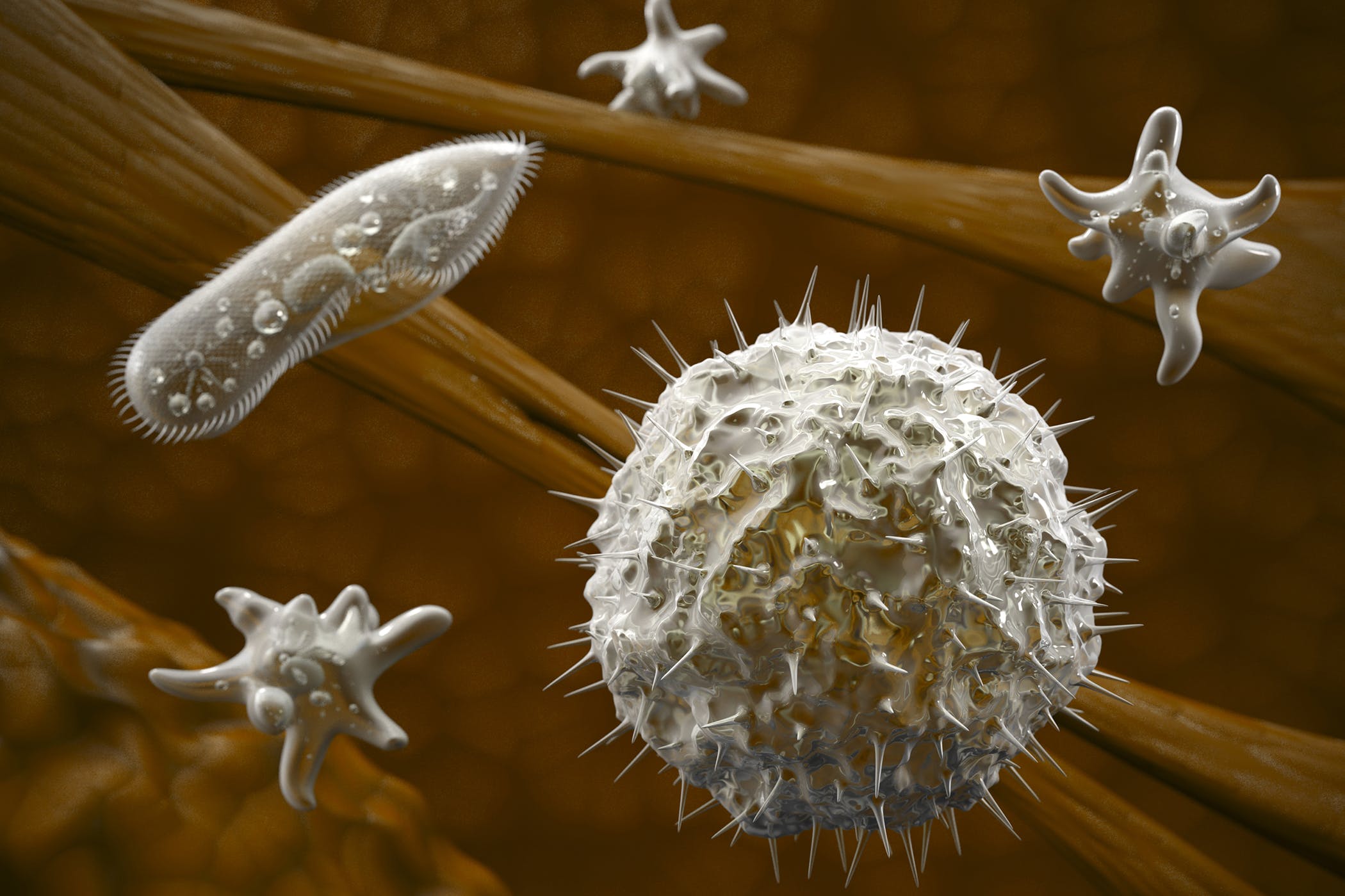
Protozoan parasites are fascinating creatures that play a significant role in the field of biology. These single-celled organisms exist in various environments, ranging from freshwater to marine habitats, and some even inhabit the bodies of animals and humans as parasites. Their ability to adapt and survive in diverse conditions makes them intriguing subjects of study for scientists.
In this article, we will explore 18 captivating facts about protozoan parasites, shedding light on their unique biology, lifecycle, and the impact they have on their hosts. From the notorious Plasmodium that causes malaria to the microscopic Giardia that causes gastrointestinal issues, each parasite has its own intricacies and effects on its host organism.
So, brace yourself for a journey into the world of protozoan parasites, where we will uncover surprising details about their survival strategies, evolutionary adaptations, and the ongoing efforts to combat the diseases they cause.
Key Takeaways:
- Protozoan parasites are single-celled organisms with complex life cycles, causing diseases like malaria. They can manipulate host behavior and develop drug resistance, posing challenges for treatment and control.
- Scientists are actively researching protozoan parasites to understand their biology and develop effective treatments. Efforts are ongoing to eradicate these parasites through collaborations and interventions, aiming to reduce the burden of infections.
Protozoan parasites are single-celled organisms.
Despite their small size, protozoan parasites are complete organisms composed of a single cell. This allows them to carry out all the necessary functions for survival, reproduction, and infection.
There are various types of protozoan parasites.
Protozoan parasites can be classified into different groups based on their characteristics and the diseases they cause. Some well-known examples include Plasmodium, which causes malaria, and Entamoeba histolytica, responsible for amoebic dysentery.
Protozoan parasites have complex life cycles.
The life cycles of protozoan parasites often involve multiple stages and hosts, making them incredibly intricate. They may undergo transformations within the host’s body or require different hosts to complete their life cycle.
Some protozoan parasites have ingenious mechanisms of transmission.
Protozoan parasites have evolved unique methods of transmission to ensure their survival and spread. Some parasites, like the malaria-causing Plasmodium, use mosquitoes as vectors to transfer from one host to another.
Protozoan parasites can cause a wide range of diseases.
Protozoan parasites are responsible for several debilitating diseases in humans. These include malaria, Chagas disease, sleeping sickness, giardiasis, and cryptosporidiosis, among others.
Some protozoan parasites have intricate ways to evade the immune system.
Protozoan parasites have developed ingenious strategies to evade the immune responses of their hosts. They can change their surface antigens or manipulate host immune cells, allowing them to persist and cause chronic infections.
Protozoan parasites have adapted to survive in diverse environments.
Protozoan parasites have become highly adaptable organisms capable of surviving in various environments. They can thrive in the human body, animal hosts, and even in water sources, making them resilient and challenging to eradicate.
Protozoan parasites can affect both humans and animals.
While some protozoan parasites primarily infect humans, others have a broader host range, impacting both humans and animals. This ability to cross species barriers highlights their adaptability and potential for zoonotic transmission.
Protozoan parasites have complex reproductive processes.
Protozoan parasites reproduce through various methods, including binary fission, multiple fission, and sexual reproduction. These processes contribute to their ability to rapidly multiply within their hosts.
Some protozoan parasites can lie dormant for extended periods.
Protozoan parasites have the remarkable ability to enter a dormant state known as a cyst. This allows them to survive harsh conditions outside their hosts and wait for a new opportunity to infect a suitable host.
Protozoan parasites can manipulate host behavior.
Some protozoan parasites, such as Toxoplasma gondii, have been found to alter the behavior of their host organisms. This manipulation increases the chances of their transmission and ultimately benefits the parasite’s survival.
Protozoan parasites can develop drug resistance.
Just like bacteria, protozoan parasites can develop resistance to the drugs used to treat infections. This poses a significant challenge in managing and controlling parasitic diseases, as effective treatment options become limited.
Protozoan parasites rely on specific vectors for transmission.
Many protozoan parasites require specific vectors, such as mosquitoes or flies, to transmit from one host to another. These vectors play a crucial role in the life cycle and spread of the parasites.
Protozoan parasites can cause severe morbidity and mortality.
Protozoan parasite infections can lead to severe illness, long-term disabilities, and even death. Malaria alone is responsible for hundreds of thousands of deaths annually, predominantly affecting children in sub-Saharan Africa.
Some protozoan parasites can be prevented and controlled.
While protozoan parasite infections present significant challenges, certain preventive measures and control strategies can help reduce their impact. These include vector control, improved sanitation practices, and the development of vaccines.
Protozoan parasites have been an area of active research.
Scientists around the world are continuously studying protozoan parasites to better understand their biology, develop new diagnostic tools, and find effective treatments. This research contributes to ongoing efforts to combat parasitic diseases.
Protozoan parasites have existed for millions of years.
Protozoan parasites have coexisted with humans and other animal hosts for millions of years, influencing their evolutionary paths. The study of ancient parasite DNA has provided valuable insights into their historical impact.
Efforts are ongoing to eradicate protozoan parasite diseases.
International organizations, governments, and research institutions are actively working towards the eradication of protozoan parasite diseases. Through collaborations and interventions, progress is being made in reducing the burden of these infections.
Conclusion
In conclusion, protozoan parasites are fascinating organisms that have a significant impact on human health and the environment. Their diverse nature and ability to adapt and survive in various environments make them a subject of interest for researchers and scientists worldwide. From their complex life cycles to their role in disease transmission, protozoan parasites have a profound influence on both humans and animals.By understanding their biology and behavior, we can develop more effective strategies for prevention, diagnosis, and treatment of parasitic infections. Ongoing research and advancements in technology provide hope for eradicating these parasites and reducing the global burden of disease they impose. As we continue to delve deeper into the world of protozoan parasites, we uncover new insights that enable us to combat these microscopic adversaries effectively.
FAQs
1. What are protozoan parasites?
Protozoan parasites are single-celled organisms that can cause diseases in humans, animals, and plants.
2. How do protozoan parasites infect their hosts?
Protozoan parasites can infect their hosts through various means, such as contaminated food or water, insect bites, or direct contact with infected individuals or animals.
3. What are some common diseases caused by protozoan parasites?
Some common diseases caused by protozoan parasites include malaria, amoebic dysentery, toxoplasmosis, and sleeping sickness.
4. Can protozoan parasites be treated?
Yes, protozoan parasite infections can be treated with specific medications and treatments tailored to the particular parasite and the disease it causes.
5. How can I prevent protozoan parasite infections?
To prevent protozoan parasite infections, it is essential to practice good hygiene, such as washing hands thoroughly, drinking safe water, and avoiding contact with infected individuals or animals.
6. Are protozoan parasites only harmful?
While many protozoan parasites cause diseases, some have beneficial roles in their ecosystems, such as aiding in nutrient cycling or controlling pest populations.
7. Can protozoan parasites be transmitted from animals to humans?
Yes, certain protozoan parasites can be transmitted from animals to humans, either directly or through vectors like mosquitoes or ticks.
Unraveling the mysteries of protozoan parasites is just the beginning of your journey into the fascinating world of microorganisms. Continue exploring by discovering more about malaria, one of the most notorious diseases caused by protozoan parasites. Learn about its global impact, transmission, prevention strategies, and ongoing research efforts to combat this deadly parasite. Dive deeper into the complex interactions between parasites and their hosts, and uncover the innovative approaches scientists are developing to outsmart these tiny yet powerful organisms. Your next adventure awaits!
Was this page helpful?
Our commitment to delivering trustworthy and engaging content is at the heart of what we do. Each fact on our site is contributed by real users like you, bringing a wealth of diverse insights and information. To ensure the highest standards of accuracy and reliability, our dedicated editors meticulously review each submission. This process guarantees that the facts we share are not only fascinating but also credible. Trust in our commitment to quality and authenticity as you explore and learn with us.


